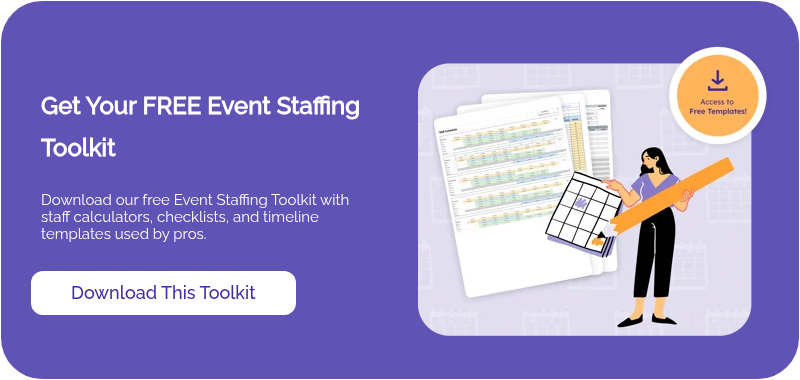Planning an event?
You know how much preparation curating the perfect experience requires. From finding the right location to coordinating logistics such as food and entertainment to managing event staff, you have to anticipate the needs of your attendees, deal with inevitable challenges, and watch your efforts culminate into a hopefully smooth and successful event.
As an organizer, your job is not over once the last few guests are leaving and the caterers are taking down the table linens. In fact, there’s one crucial step of the process of planning an event that happens after the fact – and it deserves as much thought as the work you do beforehand: the post-event survey.
What Is a Post-Event Survey?
What exactly is a post-event survey and what does it entail?
Post-event surveys are a set of questions shared with attendees after an event. The goal of these surveys is to gather feedback, opinions, and insights from event guests about various aspects of the experience. A post-event survey can be conducted through various channels, from email to online survey platforms and event apps.
As far as the content of the survey, it can cover a range of topics, from asking attendees to rate their overall satisfaction to inquiring about specific aspects of the event such as keynote speakers, venue, and catering.
You may also want to ask attendees about various parts of the logistics involved, such as the registration process or the availability of information. Most post-event surveys also include an opportunity for attendees to give suggestions for improvement.
The idea is to gather information about the attendees’ experience, their satisfaction levels, and whether your event achieved its overarching goals. This feedback can be used to refine future events and learn from both what went well and what could’ve gone better.
Benefits of Post-Event Surveys
Collecting post-event feedback in an intentional way comes with several benefits. As an organizer, it helps you gain insight into attendee satisfaction regarding various aspects of your event. Did people appreciate the networking opportunities? Did they enjoy the content of the keynote sessions? Was the food a highlight? You may be surprised to learn that some of the things that stood out to your guests were not necessarily things that you had anticipated.
Once you have more insights, it’s easier to identify the strengths and weaknesses of the event and wrap your head around which aspects of the event were most successful and what areas need improvement in the future.
From tweaking the agenda to choosing a more accessible venue, the results of your survey should highlight opportunities to enhance your next event.
Additionally, a post-event survey can provide tangible data that you can use for decision-making. You can use rating scales in your survey to quantify the success of the experience. This data-driven approach helps you optimize your strategies and manage your resources more effectively moving forward.
Armed with data and insights, it’s easier to demonstrate the ROI of your event to stakeholders. For example, you can show sponsors numbers related to attendee satisfaction and engagement. Or you can use those metrics to make an internal case for a bigger budget for events in general.
Furthermore, as an organizer, post-event surveys help you and your team foster a culture of continuous improvement. Even if you host an amazing event, you can always keep growing and learning and striving for excellence.
Finally, it’s worth noting that a post-event survey can make a good impression on attendees and help you deepen your relationship with them. By soliciting feedback, you’re showing that you value your attendees’ opinions and that you are committed to improving their experience. This builds trust between attendees and your organization.
40 Highly Effective Post-Event Survey Questions
If you want to craft a post-event survey that will help you host outstanding events, let the 40 questions below inspire your efforts.
Yes or no post-event survey questions
- Did you find the content of the event relevant?
- Was the venue suitable for the size of the event and its requirements?
- Did you find the registration process seamless and convenient?
- Were the event speakers engaging?
- Did you have enough networking opportunities during the event?
- Did the schedule allow for enough breaks and downtime?
- Did you find the event logistics efficient?
- Did you encounter any issues during the event?
- Did you feel adequately informed about the event details and agenda beforehand?
- Would you recommend this event to others based on your experience?
Multiple-choice post-event survey questions
- How would you rate the overall event experience?
a) Excellent
b) Very Good
c) Good
d) Fair
e) Poor - Which of the following aspects of the event did you find most valuable?
a) Keynote Address
b) Panel Discussions
c) Workshops
d) Networking Sessions
e) Other (Please specify) - How likely are you to attend one of our future events?
a) Very Likely
b) Likely
c) Neutral
d) Unlikely
e) Very Unlikely - How satisfied were you with the content covered at the event?
a) Extremely satisfied
b) Satisfied
c) Neutral
d) Dissatisfied
e) Extremely dissatisfied - What was your primary reason for attending?
a) Networking opportunities
b) Educational content
c) Keynote speakers
d) Professional development
e) Other (Please specify) - How would you rate the event venue?
a) Excellent
b) Good
c) Average
d) Poor - Did you find the registration process easy?
a) Yes, it was straightforward
b) Yes, but it could be improved
c) No, it was complicated
d) I did not register in advance - How satisfied were you with the food options?
a) Very satisfied
b) Satisfied
c) Neutral
d) Dissatisfied
e) Very dissatisfied - Did you experience any difficulties accessing event materials or resources?
a) Yes
b) No - How likely are you to recommend this event to a friend?
a) Very Likely
b) Likely
c) Neutral
d) Unlikely
e) Very Unlikely
Open-ended post-event survey questions
- How did you hear about this event?
- What aspects of the experience did you find most valuable?
- Were there any specific moments that stood out to you, positively or negatively?
- How can we improve future events?
- Do you have any suggestions for specific things you'd like to see at future events?
- Please share any issues you encountered at any point of the event experience, from
registration to wrap-up, and how we could address them. - What is your overall opinion of the event, and why?
- Were there any missed opportunities or areas where you feel the event could have better met your needs and expectations?
- How did attending this event contribute to your professional or personal development?
- How are you planning to apply what you got from the event in your work or personal life?
Rating scale post-event survey questions
- Please rate the overall quality of the event on a scale of 1 to 10, with 1 being poor and 10 being excellent.
- How would you rate the relevance of the event to your interests and needs?
- On a scale of 1 to 5, how satisfied were you with the variety of topics covered at the event?
- Please rate the effectiveness of the event speakers on a scale of 1 to 10, with 1 being very ineffective and 10 being highly effective.
- How would you rate the level of engagement of attendees? Please select from 1 to 5, with 1 being very low and 5 being very high.
- Please rate the ease of the registration process on a scale of 1 to 10, with 1 being very difficult and 10 being very easy.
- On a scale of 1 to 5, how satisfied were you with the venue and facilities provided for the event?
- Please rate the networking opportunities available at the event on a scale of 1 to 10, with 1 being very poor and 10 being excellent.
- How would you rate the overall value of the event in relation to the registration fee?Please select from 1 to 5, with 1 being very poor value and 5 being excellent value.
- Please rate your likelihood of attending a future event organized by us on a scale of 1 to 10, with 1 being very unlikely and 10 being very likely.
Tips to Make the Most of a Post-Event Survey
Ready to make the most of your post-event survey?
The following tips will not only help you select the best questions but also encourage survey participation. In a world where people are bombarded with information and quickly distracted, this is key.
- Tailor Survey Questions to Event Goals: Was the intention of your event to provide attendees with an overview of industry trends? Make sure there are questions in your survey that touch upon the effectiveness of the content delivered on that front. Tailor your survey questions to your event objectives so you can get relevant and actionable feedback.
- Prioritize Key Areas for Feedback: On that note, focus your survey question on the most important priorities. Survey fatigue is a real thing, so making the most of your survey entails staying focused on important elements of the event that require feedback.
- Include Different Types of Questions: For best results, aim to collect both qualitative and quantitative feedback. Using a mix of multiple-choice, rating scale, open-ended and yes-or-no questions allows you to gather comprehensive insights from attendees. You want to get your hands on cold, hard, numbers that give you a high-level overview of the success of your event, but you also want to walk away knowing what stood out to attendees and what suggestions they may have for you.
- Keep it Short and Concise: Asking people to complete a survey is asking for their time. If you want to increase the chances of attendees completing the survey, keep it short and effective – 10 targeted questions should be enough.
- Send the Survey Fast: Send the survey right after the event to make sure people don’t forget about it. Share your questionnaire within the first 48 hours after the event to engage as many attendees as possible.
- Choose the Right Tool: The right tech can increase response rates and help you collect data without glitches. From Google Forms to SurveyMonkey, there are plenty of tools out there to help you conveniently deploy a survey to a large group of people. Consider the data analysis capabilities of the platform and whether it integrates with other tools that you may already work with to make the best decision.
- Consider Using an Incentive: Some organizations offer rewards to encourage people to participate in their survey. This can look like the chance to win a prize, or it can take the form of a little gift card or discount code. There’s no need to go crazy with the incentive, but offering a little something can go a long way for boosting participation.
- Use Multiple Channels and Send Reminders: Sometimes, people need to be nudged more than once to complete a survey. Consider using multiple channels to ask attendees to give their feedback, such as email and social media. Sending a follow-up reminder or two can also help.
- Iterate Based on Feedback: Once you receive feedback, make sure you use it. Have a meeting with your team and other key stakeholders to discuss survey results. Use this opportunity to address issues, talk about areas of improvement and identify learnings that you can carry with you moving forward. Document this information so that other people in your organization can access it should they host events in the future. This will help establish best practices that you can keep refining over time.
Post-event surveys are more than formalities. They provide a valuable opportunity to step up your game as an event organizer. While some of the feedback you get might sting a little, it will highlight areas of improvement that you may not have considered.
By giving as much thought to the design and execution of your survey as you do to the planning of your event, you’ll be equipped with precious data while fostering your relationship with event attendees. Keep your survey short and sweet, ask the right mix of strategic questions, and discuss your findings with your team to make the most of this process.
To continuously improve the quality of your events and manage your events efficiently, consider Workstaff's event staff scheduling software with helpful features that make managing staff scheduling, staff communication, payroll and invoicing a breeze.
With the right tools and the right feedback, your event operations will be streamlined, and the experiences you deliver will be second to none.











